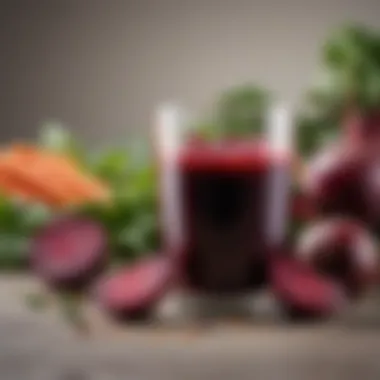Exploring Beet Juice: Health Benefits and Impacts


Intro
Beet juice has recently gained attention for its numerous health benefits. Rich in nutrients, beet root is known for its striking color and possible positive impacts on human physiology. The compounds found in beet juice may influence various health conditions, from hypertension to athletic performance. Understanding these benefits calls for a closer examination of its nutritional profile and the scientific research that supports these claims.
Research indicates that beet juice can act as a natural vasodilator, mainly due to its high nitrate content. Nitrates convert to nitric oxide in the body, which helps expand blood vessels and enhance blood flow. This effect can be particularly significant for athletes looking to boost their performance. Additionally, beet juice brings important vitamins and minerals, such as vitamin C, potassium, and fiber, contributing to improved overall health.
As many individuals incorporate beet juice into their diets, it becomes necessary to explore both the advantages it offers and any potential drawbacks related to its consumption. This article will discuss these aspects in detail, catering to readers interested in the complexities surrounding beet juice and its implications for human health.
Foreword to Beet Juice
Beet juice has received considerable attention due to its potential health benefits observed in various studies. This vibrant drink is derived from the humble beetroot, which is rich in essential nutrients and bioactive compounds. Understanding the importance of beet juice is crucial as it provides insights into how this natural product can enhance well-being. The following sections will highlight its wide-ranging benefits and implications for health.
Origin and Nutritional Profile
The origin of beet juice dates back to antiquity. Beets belong to the Beta vulgaris species, which has been cultivated since ancient times for its medicinal properties. The plant is known for its deep purple hue and sweet, earthy flavor. As it pertains to nutritional content, beet juice is packed with vitamins and minerals, including vitamin C, potassium, and manganese. One of its most significant components is the naturally occurring nitrate. Nitrates in beet juice play a key role in various biological processes, primarily affecting cardiovascular health.
Additionally, beet juice contains antioxidants such as betalains, which contribute to the vibrant color and possess anti-inflammatory properties. This unique composition strikes a balance between nutrients and functional compounds, making it a noteworthy addition to any diet.
Common Forms of Beet Juice
Beet juice can be found in several forms, adapting to various preferences and dietary needs. These are some common formats:
- Freshly Pressed Juice: Often made at home or from juice bars, this form retains the most nutrients but has a shorter shelf life.
- Bottled Juice: Available in stores, bottled beet juice can be convenient. However, some commercial products may contain preservatives or added sugars, which can diminish health benefits.
- Powdered Beet Juice: This form can be mixed into smoothies or water, providing flexibility without sacrificing health benefits. The drying process preserves the nutrients and offers a longer shelf life.
- Beet Juice Concentrates: Often used for supplements, concentrated beet juice provides a more potent source of nitrates.
Each of these forms has its unique advantages and may appeal to different consumers. Understanding these options allows individuals to incorporate beet juice into their diet in a way that best suits their lifestyle.
Cardiovascular Health
Cardiovascular health is a critical component of overall well-being. It encompasses the health of the heart and blood vessels, which play a pivotal role in delivering oxygen and nutrients throughout the body. Beet juice has gained considerable attention for its potential benefits in this area. The physiological effects of beet juice primarily stem from its high nitrate content. Nitrates convert to nitric oxide in the body, a compound essential for vasodilation. Vasodilation is the widening of blood vessels, which facilitates improved blood flow and reduced blood pressure. This is not only significant for individuals with hypertension but also benefits overall cardiovascular function.
Role of Nitrates in Blood Pressure Regulation
Nitrates found in beet juice are powerful agents for regulating blood pressure. Studies indicate that the conversion process from dietary nitrates to nitric oxide can lead to significant drops in blood pressure levels. When consumed, beet juice leads to increased nitric oxide availability. This compound signals the smooth muscles of blood vessels to relax, allowing for better blood flow and reduced arterial stiffness. This mechanism proves particularly beneficial for those at risk of cardiovascular diseases.
Research suggests that regular consumption of beet juice might lower systolic blood pressure by a measurable degree. However, the exact reduction can vary among individuals depending on their baseline blood pressure levels. This underscores the importance of integrating beet juice into a balanced diet, especially for those seeking natural methods to manage their blood pressure effectively.
Impact on Circulation and Endothelial Function
The impact of beet juice on circulation is equally noteworthy. Improved blood flow enhances the delivery of oxygen and nutrients to tissues, which is essential for cellular metabolism. This is where endothelial function comes into play. The endothelium is the inner lining of blood vessels. Healthy endothelium responds appropriately to various signals, maintaining vascular health.
Beet juice has shown the potential to promote endothelial function. By enhancing nitric oxide availability, beet juice supports the endothelium's ability to adapt to varying blood flow demands. In turn, this leads to better vascular reactivity and overall circulatory efficiency.
"The cardiovascular benefits of beet juice go beyond simply lowering blood pressure; it contributes positively to endothelial health, influencing how the body manages blood flow."
The implications for athletic performance and daily vitality are substantial. Improved circulation translates to increased stamina and reduced fatigue, fundamental aspects for athletes and individuals leading active lifestyles.
In summary, beet juice offers remarkable cardiovascular benefits through its high nitrate content. By lowering blood pressure and enhancing circulation, it plays an influential role in maintaining heart health. As more research emerges, the potential for beet juice to serve as a supplement in cardiovascular health may prove to be a significant finding.
Enhancement of Athletic Performance
The enhancement of athletic performance is a significant area of interest regarding beet juice and its physiological effects on the human body. Athletes and individuals engaged in regular physical activities continually seek ways to optimize their performance. Beet juice has emerged as a potential natural ergogenic aid due to its unique nutritional profile and specific compounds that may positively influence exercise capacity. The key components that contribute to the enhancement of athletic performance include improved blood flow, increased stamina, and reduced fatigue.
Improvement in Exercise Efficiency


One of the primary benefits of beet juice lies in its ability to improve exercise efficiency. Beet juice is rich in nitrates, which the body converts to nitric oxide. Nitric oxide plays a critical role in vasodilation, allowing blood vessels to widen. This results in enhanced blood flow to the muscles during physical exertion. Furthermore, improved blood flow ensures that muscles receive adequate oxygen and nutrients while simultaneously helping in the removal of metabolic byproducts such as carbon dioxide and lactic acid.
Multiple studies indicate that consuming beet juice before endurance exercises can lead to a noticeable increase in the efficiency of oxygen usage by muscles. Participants who consumed beet juice reported lower oxygen consumption during similar workloads compared to those who did not. This suggests that beet juice can lead to enhanced exercise performance by allowing athletes to use less oxygen for the same work, thereby potentially increasing endurance.
Beet Juice and VO2 Max
The relationship between beet juice consumption and VO2 max is another area that warrants attention. VO2 max, a measure of the maximum amount of oxygen an individual can utilize during intense exercise, is a vital indicator of cardiovascular fitness. Research has demonstrated that the ingestion of beet juice can lead to an increase in VO2 max levels in trained individuals. This enhancement of VO2 max can be particularly beneficial for athletes engaged in high-intensity sports where oxygen demand is critical.
A study published in the Journal of Applied Physiology found that when participants consumed beet juice, there was a significant improvement in their overall athletic performance, with increases recorded in their VO2 max values. The positive correlation suggests that by raising VO2 max, beet juice may help extend the duration of high-intensity exercise.
"Beet juice not only enhances athletic performance but provides a natural and effective approach to improving endurance and efficiency during workouts."
Detoxification Properties
Detoxification is a critical function for maintaining overall health. In the context of beet juice, this section aims to highlight how this natural beverage supports the body's detox processes. By understanding its unique properties, one may grasp why incorporating beet juice into one's diet can have positive implications for health. Beet juice contains various nutrients and compounds believed to aid liver function and assist in toxin removal.
Support for Liver Health
The liver plays a pivotal role in detoxification. It filters the blood, metabolizes nutrients, and breaks down harmful substances. Beet juice is rich in antioxidants, vitamins, and minerals that help to support liver health. Beetroot contains betalains, known for their liver-protective effects. These compounds help reduce inflammation and promote liver cell function. Consuming beet juice regularly may also improve enzyme activities within the liver, further enhancing its detoxifying capabilities.
Research indicates that the antioxidants in beet juice can combat oxidative stress, providing a protective effect on liver cells. This is particularly important because chronic oxidative stress can lead to liver diseases.
Aid in the Removal of Toxins
One of the noteworthy features of beet juice is its ability to assist in the removal of toxins from the body. The presence of nitrates in beet juice can enhance blood flow, improving the organ's ability to deliver nutrients and remove waste products. This improved circulation is beneficial not only for the liver but also for other organs involved in detoxification, such as the kidneys.
Beet juice is also a source of fiber, which is essential for digestive health. Fiber aids in proper digestion and helps the body eliminate waste effectively. Furthermore, it can promote regular bowel movements, which is a key factor in toxin removal.
Important Insight: Studies suggest that regular consumption of beet juice may help reduce the toxicity of heavy metals in the body, thereby supporting detox efforts.
In summary, incorporating beet juice as a part of a balanced diet could support liver function and promote the removal of toxins, being beneficial for overall health.
Influence on Inflammation
Inflammation plays a critical role in human health, often acting as a natural response of the immune system to injury or infection. However, chronic inflammation can lead to serious health issues, including heart disease, obesity, and diabetes. The influence of beet juice on inflammation is a significant area of study, as it may offer therapeutic benefits by helping to modulate inflammatory processes in the body.
Battling Oxidative Stress
Beet juice contains various phytonutrients, which may assist in battling oxidative stress. Oxidative stress occurs when there is an imbalance between free radicals and antioxidants in the body. This condition can lead to cellular damage and has been linked to various chronic diseases. Research indicates that beet juice is rich in antioxidants, such as betalains, which can counteract the damaging effects associated with free radicals. By neutralizing these harmful species, beet juice might contribute to decreased oxidative stress and, consequently, lower inflammation.
"Antioxidants present in beet juice may alter the course of oxidative stress, potentially protecting cells from damage."
In addition to its antioxidant content, beet juice may improve the body’s natural detoxification pathways. By supporting liver function, it possibly helps in removing toxins that provoke inflammatory responses. Therefore, beet juice does not only fight oxidative stress directly but also enhances the body's ability to eliminate harmful substances effectively.
Potential Role in Chronic Disease Prevention
The anti-inflammatory properties of beet juice can play a pivotal role in preventing chronic diseases. Many conditions, like arthritis and cardiovascular diseases, have a common factor: chronic inflammation. Reducing inflammation could help slow down or prevent the progression of these diseases. Studies have suggested that regular consumption of beet juice might decrease inflammatory markers in the body, thus contributing to overall health improvement.
Some potential benefits of beet juice related to chronic disease prevention include:
- Cardiovascular health: Focus on reducing inflammation linked to heart disease.
- Joint health: Alleviating ailments related to osteoarthritis or rheumatoid arthritis through its anti-inflammatory compounds.
- Metabolic syndrome: Effects on inflammation could help in better management of weight-related issues and glucose levels.
Moreover, maintaining a diet that includes foods like beet juice can lead to improved wellness in specific populations, such as older adults who are more prone to inflammation.


In summary, beet juice has the potential to influence inflammation in beneficial ways. This impact is important for its contribution to overall health, aiding in the prevention of chronic diseases and helping the body maintain a balanced inflammatory response.
Cognitive Benefits
The cognitive benefits of beet juice are an important topic due to the increasing interest in mental health and brain function. Studies suggest that the consumption of beet juice could enhance various cognitive functions, particularly in aging populations or those with cognitive impairments. This section will delve into two main aspects: the effects of beet juice on brain oxygenation and its potential link to neuroprotection.
Effects on Brain Oxygenation
One of the key components of beet juice is its high nitrate content. When consumed, these nitrates convert into nitrites in the body. This conversion plays a crucial role in the optimization of blood flow, particularly to the brain. Better blood flow means more oxygen reaches brain tissues, which is essential for cognitive performance.
Research shows that improved oxygenation can lead to enhanced mental clarity and quicker response times. A study revealed that older adults who regularly consumed beet juice showed improved cognitive performance compared to those who did not include it in their diet. Therefore, integrating beet juice into daily consumption can provide significant benefits, especially for individuals with age-related cognitive decline.
Link to Neuroprotection
Neuroprotection refers to the mechanisms that protect the brain's neurons from injury or degeneration. Beet juice may have a role in this by reducing oxidative stress. Oxidative stress occurs when there is an imbalance between free radicals and antioxidants in the body. Chronic oxidative stress is linked to the development of neurodegenerative diseases like Alzheimer’s and Parkinson’s.
The antioxidants found in beet juice, including betalains and vitamins, help to combat oxidative stress. Furthermore, some studies indicate that the dietary nitrates in beet juice might support the production of brain-derived neurotrophic factor (BDNF), a protein that plays a critical role in neuron survival and growth. This association suggests that regular consumption of beet juice may support overall brain health.
"Incorporating beet juice into your diet can be a simple yet effective way to support cognitive function and overall brain health."
To sum up, beet juice presents numerous cognitive benefits through the enhancement of brain oxygenation and its potential neuroprotective properties. By understanding these benefits, individuals can make informed dietary choices that promote better brain health.
Specific Populations
Understanding the impact of beet juice on specific populations is crucial for discerning its potential benefits and applications. Different groups may reap varying advantages from its consumption, depending on their unique physiological needs. This section highlights the effects of beet juice on elderly individuals as well as athletes and active persons, exploring how beet juice can enhance their health and performance.
Elderly Individuals
Elderly individuals often face a multitude of health challenges, including reduced circulation and increased blood pressure. Beet juice, with its naturally high nitrate content, has shown promise in improving cardiovascular health, which is pivotal for this age group. Consumption of beet juice can lead to vasodilation, or the widening of blood vessels, which in turn aids in better blood flow and may help in managing hypertension.
Research indicates that regular intake of beet juice can significantly lower systolic blood pressure in older adults. This is critical because it helps reduce the risks of heart attacks and strokes, which are prevalent in this demographic.
In addition to cardiovascular benefits, beet juice has anti-inflammatory properties that could help combat chronic inflammation, a common affliction among older adults. This could potentially lead to a decrease in the severity of various age-related diseases. The antioxidants found within beet juice may also contribute to overall health maintenance.
Athletes and Active Individuals
For athletes and those who engage in regular physical activity, beet juice serves as a powerful performance enhancer. The nitrates in beet juice not only reduce the oxygen cost of exercise but also improve overall endurance. It allows athletes to perform at higher intensities for longer durations without succumbing to fatigue quickly.
Studies have shown that drinking beet juice before workouts can increase VO2 max, allowing for better oxygen utilization during intense physical activity. This can translate to enhanced athletic performance, making beet juice a popular choice among professional athletes and fitness enthusiasts alike.
Incorporating beet juice into their diet can also assist active individuals in recovery after exercise, thanks to its anti-inflammatory properties. This may lead to reduced muscle soreness and quicker recovery times, thus enabling them to train harder and more effectively.
"Studies indicate that drinking beet juice may enhance exercises efficiency and performance in both amateur and professional athletes."
Ultimately, beet juice can be an advantageous addition for both elderly individuals and athletes, addressing unique health considerations while promoting overall wellness. As research progresses, the understanding of its role in specific populations continues to expand, suggesting a wide array of applications and benefits.
Recommended Consumption Practices
Recommended consumption practices play a crucial role in maximizing the health benefits of beet juice. When consumed properly, beet juice can enhance nutrition and promote well-being. However, understanding optimal dosages and how to integrate it into daily meals is essential for a balanced approach.
Optimal Dosage Guidelines
Determining the right amount of beet juice is important for obtaining its positive effects without risking potential side effects. Most studies suggest a daily intake of about 250 to 500 milliliters of beet juice, depending on individual tolerance and health goals. Starting on the lower end of this range can help assess personal response. For example, consuming around 250 milliliters of beet juice can be sufficient to enjoy benefits such as improved blood flow and reduced blood pressure.


- Consider these factors when determining your dosage:
- Health status
- Physical activity levels
- Personal preferences
- Overall diet
If you experience any discomfort, such as digestive issues or changes in color of urine, it may be wise to reduce the volume consumed. Always consult with a healthcare professional, especially if one has underlying health conditions.
Integration into Daily Diet
Integrating beet juice into the diet can be simple yet rewarding. There are various ways to enjoy this nutritious beverage while ensuring a balanced diet. Here are some methods to incorporate beet juice:
- Smoothie Blends: Add beet juice to your morning smoothie for a vibrant color and a nutritional boost. Mixing it with fruits like bananas or berries can enhance flavor.
- Salad Dressings: Use beet juice as a primary ingredient in homemade salad dressings. Combining it with olive oil, vinegar, and spices can create a refreshing dressing.
- Soups: Incorporate beet juice into soups for added nutrition and color. A beet and tomato soup is not just visually appealing but also rich in vitamins.
- Cooking Rice or Quinoa: Use beet juice to cook grains like rice or quinoa. It will lend a lovely hue while increasing their health benefits.
Regular consumption can result in improved energy levels and overall wellness, so find ways to enjoy beet juice daily. With its unique taste and color, it can enhance both the appearance and nutrition of many meals.
"Understanding how to consume beet juice effectively is essential for obtaining its many health benefits, making it not just a drink but a part of a healthier lifestyle."
Beet juice can be a powerful addition to one’s diet when consumed correctly. Emphasizing moderation and proper integration into meals can promote a sustainable and health-conscious lifestyle.
Potential Side Effects and Considerations
Understanding the potential side effects and considerations around beet juice is essential for those thinking about integrating it into their diets. While beet juice is often praised for its health benefits, it is not without possible adverse effects. This section aims to discuss the common reactions experienced by certain individuals and how beet juice might interact with various medications.
Possible Reactions in Sensitive Individuals
Beet juice contains several compounds that can trigger reactions in some people. For individuals who are sensitive to nitrates and oxalates, consuming beet juice can lead to nausea, headaches, or gastrointestinal symptoms.
- Nitrates can convert to nitric oxide, which usually aids in vasodilation. However, in sensitive individuals, excessive nitrate intake might cause a sudden drop in blood pressure, leading to lightheadedness or dizziness.
- Oxalates in beet juice can contribute to kidney stone formation in those predisposed to this condition. It is essential for these individuals to consult healthcare professionals before making beet juice a part of their routine.
"Moderation is key, especially for individuals with known sensitivities or underlying health conditions."
Interaction with Medications
Beet juice may interact with various medications, particularly those affecting blood pressure and cardiovascular function.
- Blood Thinners: Patients taking anticoagulants should exercise caution, as beet juice can affect blood viscosity.
- Antihypertensive Drugs: Because of beet juice’s potential to lower blood pressure, it can enhance the effect of antihypertensive medications, leading to hypotension.
- Diabetes Medications: The glucose-regulating effects of beet juice might influence blood sugar levels. Thus, diabetic individuals should monitor their glucose when consuming beet juice alongside medications.
In light of these considerations, it is advisable for individuals on medication to discuss their beet juice intake with a healthcare provider. This cautious approach helps to mitigate the risk of adverse effects and ensures a safe and informed dietary choice.
Epilogue
The conclusion of this article on beet juice emphasizes its multifaceted role in promoting health and well-being. Understanding the extensive benefits of beet juice, it becomes clear that its inclusion in a diet can serve various physiological needs. From enhancing cardiovascular health to aiding in athletic performance, beet juice presents a compelling case for health-conscious individuals.
Summary of Benefits
Beet juice offers numerous health benefits:
- Cardiovascular Health: It helps lower blood pressure and improves circulation due to high levels of nitrates, which convert to nitric oxide in the body.
- Enhanced Athletic Performance: Many studies show that beet juice can enhance exercise efficiency, helping athletes perform better during high-intensity workouts.
- Detoxification: Beet juice supports liver function, facilitating the removal of toxins from the body.
- Anti-inflammatory Properties: It may play a role in reducing markers of inflammation, potentially aiding in the prevention of chronic diseases.
- Cognitive Support: Beet juice promotes brain oxygenation, possibly leading to improved cognitive functions and neuroprotection.
Overall, the evidence suggests that beet juice is not merely a health trend, but a beneficial addition to various nutritional strategies.
"Beet juice is not just a colorful drink; it is a powerhouse of nutrients that can significantly impact health positively."
Future Research Directions
Looking ahead, there is a substantial scope for future research on beet juice. Some key avenues include:
- Long-term Effects: Investigating the long-term health benefits versus risks of regular beet juice consumption.
- Specific Populations: Further studies focusing on its benefits for various demographics, such as the elderly or those with specific health conditions.
- Synergistic Effects: Understanding how beet juice interacts with other foods or supplements.
- Bioavailability: Exploring how different preparation methods affect the availability of its nutrients in the body.
This ongoing research will shed more light on the full potential of beet juice as a functional food and its implications for public health.















